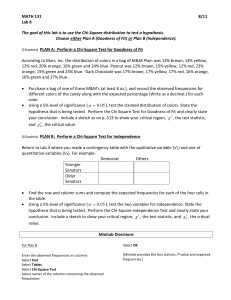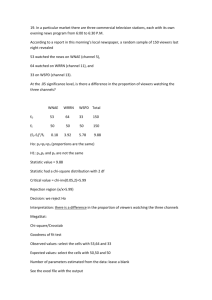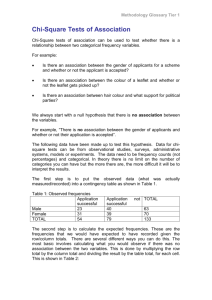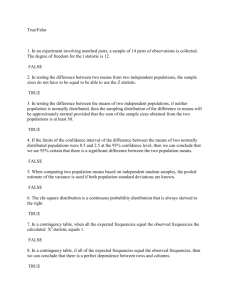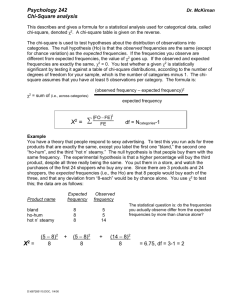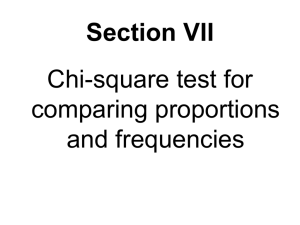The Chi-Square Distribution
advertisement
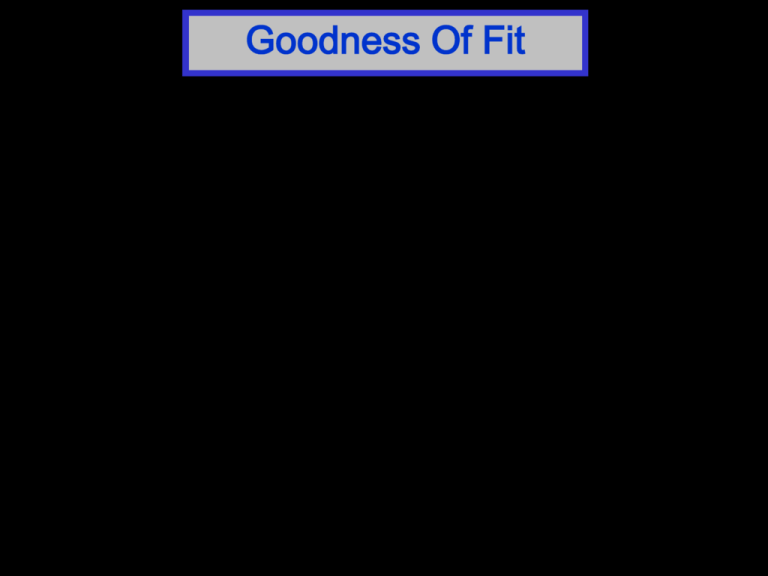
Goodness Of Fit Goodness Of Fit The purpose of a chi-square goodness-of-fit test is to compare an observed distribution to an expected distribution. For example, suppose there are four entrances to a building. You want to know if the four entrances are equally used. You observe 400 people entering the building on a random basis: Entrance Observed Frequency Expected Frequency Main Back Side 1 Side 2 Total 140 120 90 50 400 100 100 100 100 400 H0: pM = pB = pS1 = pS2 H1: The proportions are not all equal. If the entrances are equally utilized, we would expect each entrance to be used approximately 25% of the time. Is the difference shown above statistically significant? Chi Square Test If the observed frequencies are obtained from a random sample and each expected frequency is at least 5, the sampling distribution for the goodnessof-fit test is a chi-square distribution with k-1 degrees of freedom. (where k = the number of categories) Test Statistic 2 f o f e 2 fe O = observed frequency in each category E = expected frequency in each category Goodness-of-Fit Test: Equal Expected Frequencies Let f0 and fe be the observed and expected frequencies, respectively. H0: There is no difference between the observed and expected frequencies. H0: p1 = p2 = p3 = p4 H1: There is a difference between the observed and the expected frequencies. H1: The proportions are not all equal. k-1 degrees of freedom. (where k = the number of categories) See Table P.495 df = 3 df = 5 df = 10 2 EXAMPLE The following information shows the number of employees absent by day of the week at a large manufacturing plant. At the .05 level of significance, is there a difference in the absence rate by day of the week? Day Monday Tuesday Wednesday Thursday Friday Total Frequency 120 45 60 90 130 445 EXAMPLE continued The expected frequency is: (120+45+60+90+130)/5=89. The degrees of freedom is (5-1)=4. The critical value is 9.488. (Appendix B, P.495) Example continued Day Monday Tuesday Wednesday Thursday Friday Total Freq. 120 45 60 90 130 445 Expec. 89 89 89 89 89 445 Because the computed value of chi-square is greater than the critical value, H0 is rejected. We conclude that there is a difference in the number of workers absent by day of the week. (fo – fe)2/fe 10.80 21.75 9.45 0.01 18.89 60.90 2 f o f e 2 fe Example Goodness of Fit A seller of baseball cards wants to know if the demand for the following Cards Sold 6 cards is the same. Tom Seaver Nolan Ryan Ty Cobb George Brett Hank Aaron Johnny Bench 13 33 14 7 36 17 120 Goodness of Fit Test MegaStat Tom Seaver Nolan Ryan Ty Cobb George Brett Hank Aaron Johnny Bench Observed 13 33 14 7 36 17 120 Expected 20 20 20 20 20 20 120 34.40 chi-square 5 df 1.98E-06 p-value O-E -7.000 13.000 -6.000 -13.000 16.000 -3.000 0.000 (O - E)² / E 2.450 8.450 1.800 8.450 12.800 0.450 34.400 % of chisq 7.12 24.56 5.23 24.56 37.21 1.31 100.00 Goodness Of Fit (unequal frequencies) Example - Goodness Of Fit (unequal frequencies) The Bank of America (BoA) credit card department knows from national US government records that 5% of all US VISA card holders have no high school diploma, 15% have a high school diploma, 25% have some college, and 55% have a college degree. Given the information below, at the 1% level of significance can we conclude that (BoA) card holders are significantly different from the rest of the nation? Education Observed Frequency Expected Frequency Some HS HS Diploma Some College College Degree Total 50 100 190 160 500 25 75 125 275 500 = (500)(.05) = (500)(.15) = (500)(.25) = (500)(.55) 2 fo fe 2 115.22 fe C 11.345 2 df = (4 - 1) = 3 Reject H0 Limitations of Chi-Square Limitations of Chi-Square 1.) If there are only 2 cells, the expected frequency in each cell should be at least 5. 2.) For more than 2 cells, chi-square should not be used if more than 20% of fe cells have expected frequencies less than 5. Roll-Of-The-Die Experiment Outcome 1 2 3 4 5 6 TOTAL Observed Frequency Expected Frequency 3 6 2 3 9 7 30 5 5 5 5 5 5 30 Two-thirds of the computed chi-square value is accounted for by just two categories (outcomes). Although the expected frequency is not less than 5, too much weight may be given to these categories. More experimental trials should be conducted to increase the number of observations. Goodness of Fit Test MegaStat observed 3 6 2 3 9 7 30 expected 5.000 5.000 5.000 5.000 5.000 5.000 30.000 7.60 chi-square 5 df .1797 p-value O-E -2.000 1.000 -3.000 -2.000 4.000 2.000 0.000 (O - E)² / E 0.800 0.200 1.800 0.800 3.200 0.800 7.600 % of chisq 10.53 2.63 23.68 10.53 42.11 10.53 100.00 Independence & Contingency Tables Contingency Table Analysis A contingency table is used to investigate whether two traits or characteristics are related. Each observation is classified according to two criteria. The degrees of freedom is equal to: df = (# rows - 1)(# columns - 1). The expected frequency is computed as: Expected Frequency = (row total)(column total)/Grand Total EXAMPLE Is there a relationship between the location of an accident and the gender of the person involved in the accident? A sample of 150 accidents reported to the police were classified by type and gender. At the .05 level of significance, can we conclude that gender and the location of the accident are related? Gender Work Home Other Total Male 60 20 10 90 Female 20 30 10 60 Total 80 50 20 150 EXAMPLE continued Gender Work Home Other Total Male 60 20 10 90 Female 20 30 10 60 Total 80 50 20 150 The expected frequency for the work-male intersection is computed as (90)(80)/150=48. Similarly, you can compute the expected frequencies for the other cells. H0: Gender and location are not related. H1: Gender and location are related. EXAMPLE continued H0 is rejected if the computed value of χ2 is greater than 5.991. There are (3- 1)(2-1) = 2 degrees of freedom. Find the value of χ2. 2 60 48 2 48 10 82 ... 8 16 .667 H0 is rejected. We conclude that gender and location are related. MegaStat Example Contingency Tables A crime agency wants to know if a male released from prison and returned to his hometown has an easier (or more difficult) time adjusting to civilian life . Residence After Release From Prison Hometown Not Hometown Total MegaStat Hometown Adjustment to Civilian Life Outstanding Good Fair Unsatisfactory Total 27 35 33 25 120 13 40 15 50 27 60 25 50 80 200 Chi-square Contingency Table Test for Independence Observed Expected Not Hometown Observed Expected Total Observed Expected Outstanding 27 24.00 13 16.00 40 40.00 Good 35 30.00 15 20.00 50 50.00 5.73 chi-square 3 df .126 p-value Fair Unsatisfactory 33 25 36.00 30.00 27 25 24.00 20.00 60 50 60.00 50.00 Total 120 120.00 80 80.00 200 200.00
